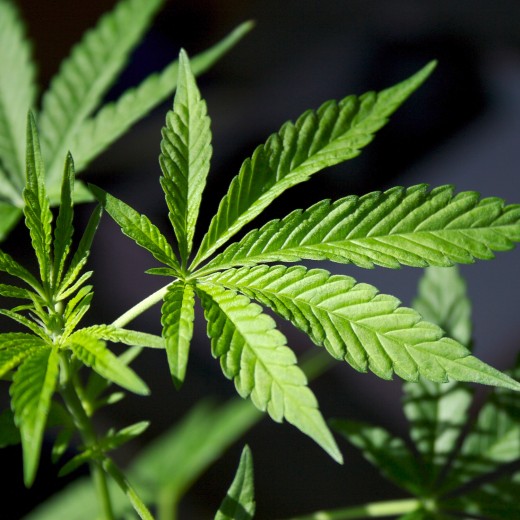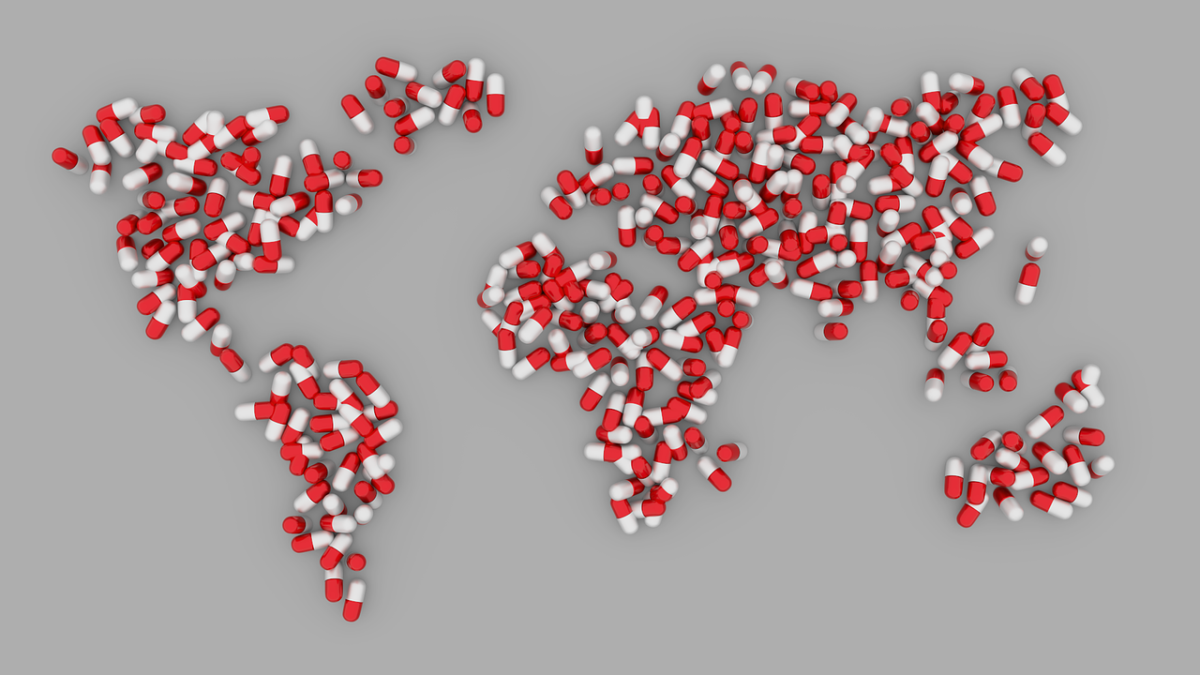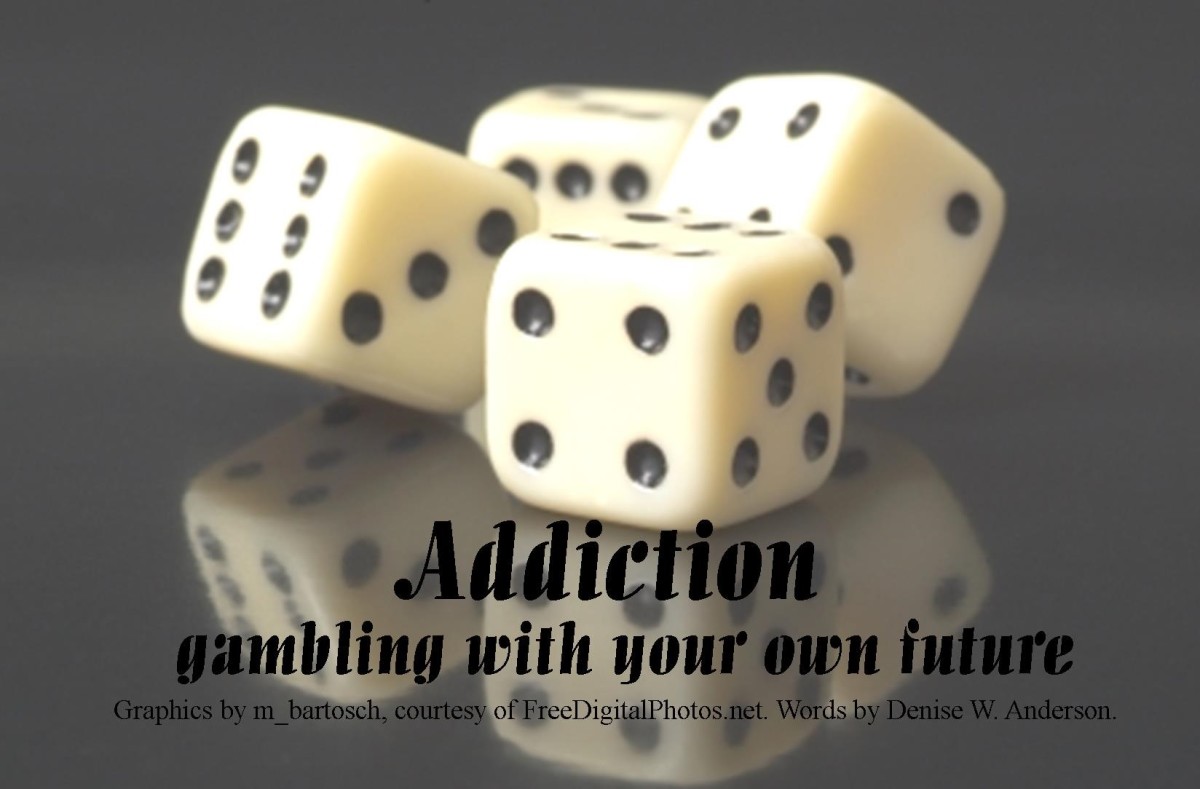- HubPages»
- Health»
- Mental Health»
- Addiction»
- Drug Addiction
Keeping Marijuana (Cannabis) Illegal
Marijuana or Cannabis: To be or not to be?

Keeping Marijuana Illegal: An Opinion Paper
Introduction
Since the advent of modern technology and scientific development, man has been in constant pursuit of anything and everything which will not only make his life easier and fun but also pleasurable and leisurely. Over time, the physical manifestations of these developments have not satisfied man so he resorted to looking for substances that will make him feel better even when conditions and situations do not seem favorable. This desire for substances led man to use plants and animal substances which he believed can make him forget his pains, sorrows, stress, and reality. As time passed, modern medicine has unlocked key substances which will make man’s pain go away paving the way for better methodologies of surgery and recuperation. However, since man does not only long for longevity but also for pleasure, he experimented with herbs, spices, serums, and even materials that are organic or non-organic. One of these organic substances that man has been using to better his condition is marijuana, yet this plant has been the center of much argument for its very nature and purpose. Some believe that its medicinal qualities merit it as a legal drug to be grown, harvested, and used to better man’s conditions. Some maintain that it is one of nature’s forbidden herbs never to be used for any other purpose except medicinal cases or to totally abandon the desire to even try using it for fear of addiction. For this purpose, this paper is written to highlight the truth that the disadvantages outweigh the benefits of marijuana use and that for that alone it must not be legalized.
Understanding Marijuana or Cannabis
There are numerous reasons why marijuana remains one of the most difficult drugs to be removed or banned. Users of marijuana have described the effects of its intoxication. They describe these with feelings of euphoria and elation followed by a state of calmness and a state of peace of mind. The consensus of professed users of the said drug ascribes to sensations of heightened sensory awareness, increased appetite, and pleasure. There are also reports of mood changes followed by altered time and space perceptions (Iversen, 2009). All these feelings of comfort, peace, and euphoria are attributed to the use of marijuana among people who have tried or are willing to try it considering that there are positive results following its use.
Marijuana (cannabis) belongs to a classification of “impure plant substances, such as flower tops or leaves whether used by smoking or ingestion.” Composed generally of tetrahydrocannabinol (THC) which is the main component of marijuana, it is believed to have the potent power to cause addiction and dependence among users. In a journal article published by Joy, Watson, and Benson in 2008 titled “Marijuana and Medicine” at the Washington State Institute of Medicine, they wrote that “potential infatuation of people to marijuana may cause serious health impacts to the human body (547). In a similar article written by Volkow, Baler, Compton, and Weiss in 2009 titled “The Adverse Health Effects of Marijuana Use” and published in The New England Journal of Medicine, the proponents mentioned that some of the negative effects following intoxication are a distraction to attention, short-term memory loss, lowering of cognitive functions, and poor judgment. Other adverse effects noted following their observations and experiments are palpitation, balance, and motor coordination. For prolonged and continued use, the researchers noted that the users exhibit serious problems in mental and physical health leading to low life achievements (24). Another part of their observation notes that those who excessively use marijuana will not give any health benefit to the user but will most likely lead to further addiction. The article goes on to point out that even a little use for relaxation may have a powerful addictive effect on the user thus suggesting that marijuana is bad for people and should never be legalized. Although there are few states in the US that have legalized marijuana for its medicinal value, they still, however, acknowledge the truth that it is a “getaway drug” which means that it does not directly heal the patient but only lessens the pain in the process of healing. Hall and Lynskey published an article in 2005 titled “Is cannabis a getaway drug?” which shows that consuming marijuana is known to lead to the consumption of other more potent prohibited drugs. In their study, they mentioned that in the 1970s, many significant studies have been made and have shown that people who are currently using illicit drugs such as heroin and cocaine were once marijuana users (40). This scenario paints an ugly picture of how marijuana, with all its proven medicinal value, can be a subtle ‘getaway’ to higher and stronger drugs which could tragically and fatally lead to addiction and potential death. With opposing yet remarkably real consequences surrounding the use and legalization of marijuana, why is it that legislators, medical people, and the general public are all puzzled with this herb or drug? The answer lies in the view of these three key players in society. Sadly, over the years, many people have not come to a consensus as to how and why marijuana should be banned.
Cannabis Can be Found almost Anywhere
In today’s grim reality, the streets are littered with illegal drugs ranging from cheap syrups or tablets to ultra-expensive compounds and mixtures. Volkow et. al. in their article report that America has a staple consumption of ecstasy, cocaine, and marijuana with rave and other related substances trailing the list. These drugs are so commonly used that they are regarded as part of the American lifestyle. Yet, they mentioned that marijuana may not be considered ‘hard’ since it has medicinal values as opposed to the other two mentioned which individually have none (28). This segment that marijuana has healing purposes yet also has addictive qualities is what makes the argument even more chaotic. Compounding the problem is that legislators do not want to offend the voting public which favors the legalization of marijuana thus they leave the matter to the hands of the people and their individual discretion. History has it that in 1972, the US Congress placed marijuana under Schedule I of the Controlled Substance Act. This only means that the US government does not acknowledge marijuana for its medicinal value and that it is not legitimate for legal debate or even legal consideration(s). However, this year, upon the submission of a proposition by several voters in the state of California, the National Conference of State Legislatures began contemplating marijuana solely for its medicinal value. Since then more than 20 US states have followed calling for a similar motion to reconsider the legal use of marijuana. Currently, there are states which allow the use of marijuana even in public places (Medical Marijuana ProCon).
In a last year’s news report presented in Charisma News, writer/reporter James Kennedy concluded his 2013 article titled “The Problem with Pot: Legalization, Growing Acceptance, Increase Risk of Abuse” with the line: “Drug abuse experts are convinced the number of addicts will grow as more states legalize recreational and medical marijuana” (N.p). Note that the two facts are inseparable: marijuana has medicinal healing qualities, but it also has highly addictive and negative effects.
Legislation Seems to Kowtow to the Public’s Cannabis Demand
For this part, let us discuss why is it that the legislature wants to succumb to the public’s whim of legalizing marijuana. Jane Carroll wrote in 2005 that marijuana legalization can potentially snowball and lead to more problems. Although the article seems to support the pro-marijuana scheme, it nonetheless, gives a bird’s eye view of things to come should it be done so. She wrote that when marijuana becomes legal farmers can earn by growing them as cash crops,
“The impact on tax revenues and consumption will be reliant on various design choices such as the tax level, whether there is a reward for a continued black market, whether to tax or regulate the levels of cannabinoid, whether there are allowances for home cultivation, restriction in advertising, and the way the regulatory system is adjusted and designed” (Carroll, 2005)
With even people from economics and agriculture joining the bandwagon estimating the investment returns through the marketing of marijuana, it is no wonder why this should be stopped since the purpose is self-serving and not for the benefit of the whole.
From the medical field such as the staunch supporter of the marijuana legalization movement, the Medical Marijuana ProCon in 2014 cited that the plant holds promising treatment symptoms for epilepsy, cancer, multiple sclerosis, glaucoma, pain, Acute Immuno-Deficiency Syndrome (AIDS), and other health conditions. There are also international organizations across the world that show and give support for this stand ranging from leading government agencies, medical organizations, and peer-reviewed studies. These constitute the backbone of the drive toward marijuana legalization. And there seems to be no turning back from these groups as they are persistent to make the drug legal.
The Anti-Marijuana Drive and Argument
The strength of the anti-marijuana groups rests on simple reason and common sense. The anti-legalization drive is firm in its resolve to make sure that marijuana does not become available to the level of sin products such as cigarettes and liquor. The reason is based on the non-approval and non-endorsement of the Food and Drug Authority (FDA) for marijuana. If there is any official government organization, department, or bureau which may turn the tide of legalization, it is the FDA. FDA maintains that marijuana, despite its medicinal value, can be a health threat more than a cure. California NORML released this year findings which suggest that marijuana weakens and damages internal systems of the human body which have negative effects on women's fertility and motor coordination aside from the usual potential addiction to stronger substances issue. This goes on to suggest that Proposition 2015 should be abolished for the purpose of preventing the drug from harming a person or the whole society (State Medical Marijuana Laws).
Statistics have shown a slow yet steady rise in the support for the legalization of marijuana across the US. In 2010, 46% of the population are in favor of the legalization while a strong 50% are anti-legalization. There was a 2% increase from 44% in 2009 to 46% in 2010. However, this 2% is insignificant according to George Lynch who published a controversial article titled “Legalizing Drugs Is Not the Solution” in 1993. Lynch wrote that comparing this meager 2% increase to data from the Annual Crime Poll from Gallup, for every 10 people surveyed, eight did not show their support for the marijuana legalization movement in the country (110-111). This is also supported by another survey conducted by Mendez and Winkler in 1996 who open their article with a conclusion that “from the statistical data presented, many people still believed that the legalization of marijuana in the whole country will provide no further benefit aside from drug addiction and that it must be rejected to prevent further damage of the society (Marihuana Tax Act of 1937, 2).
The drive to prevent this legalization is anchored on the concerted efforts put forth by concerned US citizens and numerous organizations which objectively see marijuana for its entirety, not on its mere face or ephemeral value. There are many studies that prove the veracity of addiction to stronger drugs should one resort to continued marijuana use. Whether legislators or users, economists or farmers, producers or consumers; these are all insignificant according to Andrew Weil who wrote “The Natural Mind—An Investigation of Drugs and the Higher Consciousness” 1985. He stressed what the main concern is with the lines ‘whether the policies and percentage of people using marijuana have a casual or correlative relationship’ but the actual behavior of most Americans toward cannabis, its use, and purpose. (Weil, 1985). As the news, surveys, crime polls, and researches supply an increasing number of cases involving marijuana-related cases, more and more people are pointing to the state policies which allowed the legalization of the drug. If this goes unchecked and unaccounted for, this vicious cycle of blame game will never cease meanwhile aggravating the situation of marijuana and stronger drug-related issues.
Why Should Cannabis/Marijuana be Banned?
First, it works like heroin and cocaine. Several studies have shown that ‘therapeutic marijuana regulations would increase marijuana use by ten to twenty percent.’ It is a ‘hard drug’ which literally means that it has a strong addictive effect on the user. Although pro-legislation claims that there will be a potential decrease in the abuse cases of heroin and cocaine users following the legalization of marijuana, there have neither recent supporting statistics nor research pieces of evidence to prove such a claim yet. However, there is an ongoing rise in the reported cases of marijuana use (Inciardi, 1986).
Second, while the legalization movement seems to focus on the medical and health benefits of the drug, it is the youth who will be most vulnerable to addiction and substance abuse. Considering that there is already an ongoing escalation of pervasiveness among teenagers coupled with violence and delinquency reports, adding a more potentially harmful item on the streets can be another problem waiting to snowball into a grand crisis. Note that as more and more youth can enjoy ‘medicinally accepted yet potentially harmful substance,’ the last thing you know curiosity has kicked in and they are already down the drain. Allowing such to happen is merely creating a ticking time bomb; it will catastrophically explode soon.
Third, if the odds of the substance having more advantages than drawbacks, why has it not already been legal in the first place since it has long been used by many people both modern and anciently? The point of all this is that it is illegal for a reason. Same with the poppy herb which was once used in ancient China for noodles, it was outlawed thanks to modern science and medicine. What many are trying to do is the exact opposite! Modern science has proven that it may hold healing properties, yet the negatives outweigh the plus factor; people still insist on legalizing it. What a waste of precious time, energy, resources, and brain power to even just consider its legalization.
Conclusion
There is a grand reason why things are branded ‘illegal.’ There are only two ways to check if one principle, theory, or idea is true or not: immersion. Yet a smart individual knows that he must not go to an erupting volcano to measure its heat or even test the temperature. A thinking individual uses his senses to know things of their value; a smart person may use only one or two of his senses in order to understand something in its entirety. Suffice it to say, smart people know that there is a higher reason why some things are forbidden, and some are not. For this purpose, this paper affirms that marijuana is bad and that the negative consequences of using it outweigh the medicinal values thus it is ‘illegal.’ With all the senses of a single individual, it is quite alarming that some fail to use their most basic yet simplest sense ----- common sense!
References
Carroll, J. (2005). “Who Supports Marijuana Legalization? Support rising; varies most by age and gender.” GALLUP. April 16, 2019. N.p. < http://www.gallup.com/poll/19561/who-supports-marijuana-legalization.aspx>
California NORML.“California NORML Patient's Guide to Medical Marijuana” 2014. Web. 1 Apr. 2014. <http://www.canorml.org/medical-marijuana/patients-guide-to-california-law>
Hall, W. & Lynskey, M. (2005). “Is cannabis a gateway drug? Testing hypotheses about the relationship between cannabis use and the use of other illicit drugs” Office of Public Policy and Ethics, Institute for Molecular Bioscience, University of Queensland, St Lucia, Qld 4072. Department of Psychiatry, University of Washington School of Medicine, St Louis, Missouri, USA. Pp. 38 – 62. <file:///C:/Users/Toshiba/Downloads/Hall%20%2526%20Lynskey%20(2005)%20Is%20cannabis%20a%20gateway%20drug%20-%20Testing%20hypotheses%20about%20the%20relationship%20between%20cannabis%20use%20and%20the%20use%20of%20other%20illicit%20drugs.pdf>
Inciardi, James A. (1986). The War on Drugs: Heroin, cocaine, crime, and public policy. Palo Alto: Mayfield Publishing Company. p. 143 – 234.
Iversen, Leslie. (2009). “Marijuana.” Encarta Encyclopedia, Microsoft Corporation Ltd., Vol. 3.
Joy, J., Watson, S.Jr., & Benson, J. Jr. (Eds.) (2008). “Marijuana and Medicine.” Institute of Medicine: Division of Neuroscience and Behavioral Health. National Academy Press: Washington, D.C. 2014. Pp. 546 – 568. http://www.nap.edu/openbook.php?record_id=6376&page=R1
Kennedy, J. (2013). “The Problem with Pot: Legalization, Growing Acceptance, Increase Risk of Abuse.” Charisma News. April 16, 2019. N.p. http://www.charismanews.com/us/41288-the-problem-with-pot-legalization-growing-acceptance-increase-risk-of-abuse
Lynch, G. (1996). “Legalizing Drugs Is Not the Solution”. America 13 Feb. 1993. Rpt. in Legalizing Drugs Would Not Reduce Crime. At Issue: Legalizing Drugs. Karin L. Swisher, ed., San Diego, CA.: Greenhaven Press, Inc., 110–113.
Medical Marijuana: “Should Marijuana Be a Medical Option?” USA: 233 Wilshire Blvd., Suite 200, Santa Monica, CA 90401 2014. Web. 1 Apr. 2014. <Medicalmarijuana.procon.org.>
Mendez, J. & Winkler, R. “Marihuana Tax Act of 1937”. Jan. 1996. 24 Mar. 2004 (rev.). Pp. 2 – 12.
Weil, Andrew (1985). The Natural Mind—An Investigation of Drugs and the Higher Consciousness. Houghton Mifflin. pp. 17-18.
Volkow, N., Baler, R., Compton, W., and Weiss, S., (2009), Adverse Health Effects of Marijuana Use. The New England Journal of Medicine. LONDON: Imperial College. Pp. 22 – 64. www.scribd.com. Web. Retrieved from: < http://www.scribd.com/doc/228421726/Volkow-Adverse-Effects-of-Marijuana-Use-2014>








